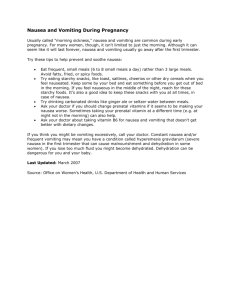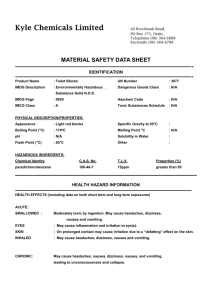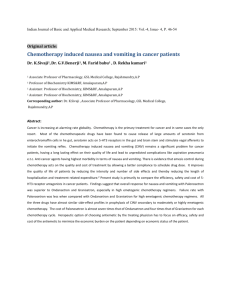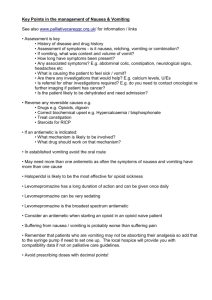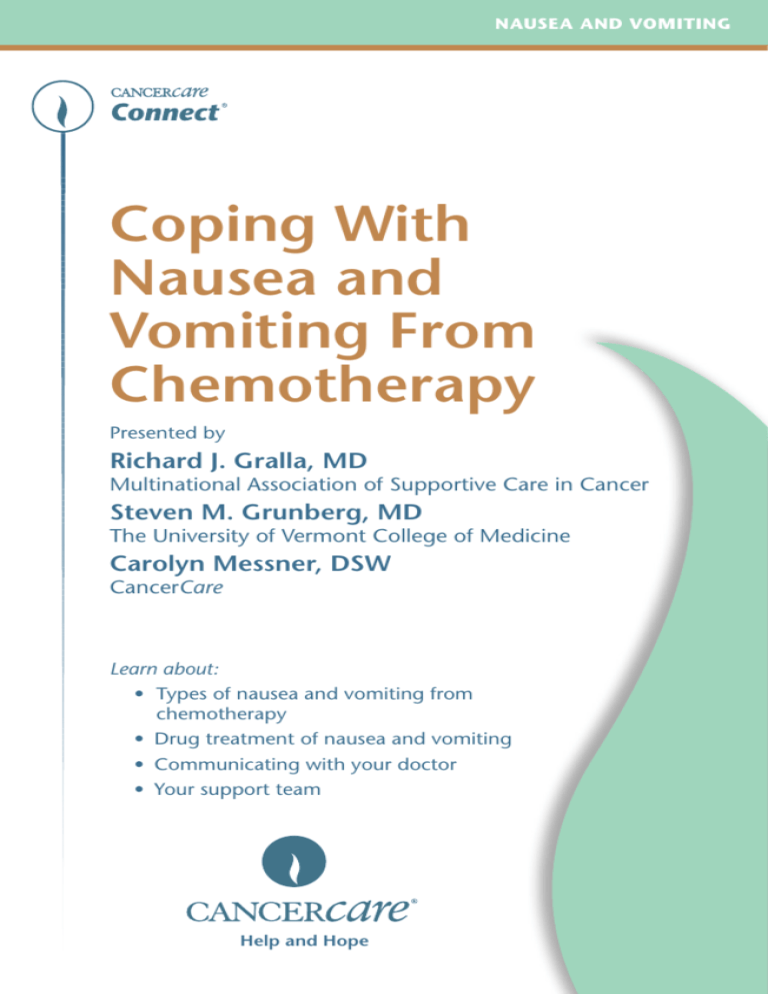
NAUSEA AND VOMITING
Coping With
Nausea and
Vomiting From
Chemotherapy
Presented by
Richard J. Gralla, MD
Multinational Association of Supportive Care in Cancer
Steven M. Grunberg, MD
The University of Vermont College of Medicine
Carolyn Messner, DSW
CancerCare
Learn about:
• Types of nausea and vomiting from
chemotherapy
• Drug treatment of nausea and vomiting
• Communicating with your doctor
• Your support team
Help and Hope
CancerCare is a national nonprofit organization that provides free, professional
support services to anyone affected by cancer: people with cancer, caregivers,
children, loved ones, and the bereaved. CancerCare programs—including
counseling, education, financial assistance, and practical help—are provided by
trained oncology social workers and are completely free of charge. Founded in
1944, CancerCare provided individual help to more than 97,000 people last year
and received nearly 2.1 million visits to its websites. For more information, call
1-800-813-HOPE (4673) or visit www.cancercare.org.
Contacting CancerCare
National Office
CancerCare
275 Seventh Avenue
New York, NY 10001
Email: teled@cancercare.org
Administration
Tel: 212-712-8400
Fax: 212-712-8495
Email: info@cancercare.org
Website: www.cancercare.org
Services
Tel: 212-712-8080
1-800-813-HOPE (4673)
If you are a health care professional interested in ordering free copies of this
booklet for your patients, please use the online order form on our website,
www.cancercare.org.
Coping With Nausea
and Vomiting From
Chemotherapy
Presented by
Richard J. Gralla, MD
Past President
Multinational Association of Supportive Care in Cancer
New York, NY
Steven M. Grunberg, MD
Professor of Medicine
The University of Vermont College of Medicine
Burlington, Vermont
Carolyn Messner, DSW
Director of Education & Training
CancerCare
The information in this booklet is based on the CancerCare Connect®
Telephone Education Workshop “Management of Nausea, Vomiting,
and Other Symptoms from Cancer Treatment.” The workshop was
conducted by CancerCare in partnership with the American Association
of Occupational Health Nurses, American Society of Clinical Oncology,
Association of Oncology Social Work, Intercultural Cancer Council,
Multinational Association of Supportive Care in Cancer, and The
Wellness Community.
INTRODUCTION
n HOW
page 2
CHEMOTHERAPY CAUSES NAUSEA AND VOMITING, page 3
n DRUG
TREATMENTS FOR NAUSEA AND VOMITING, page 5
n YOUR
SUPPORT TEAM, page 9
FREQUENTLY ASKED QUESTIONS
page 12
GLOSSARY (definitions of blue boldfaced words in the text)
page 14
RESOURCES
page 16
This patient booklet was made possible by a
charitable contribution from Merck & Co., Inc.
Doctors now have many
ways to prevent and ease
nausea and vomiting
from chemotherapy.
Many surveys have shown that patients and their loved
ones believe nausea and vomiting occur with all types
of chemotherapy (anti-cancer drugs). But half of the
chemotherapy drugs now in use only became available in the
past several years. And the side effects caused by the newer
drugs are not necessarily the same as those caused by older
drugs. However, many people
receiving chemotherapy may
still experience nausea and
vomiting. Fortunately, doctors
now have many ways to prevent
and ease their symptoms.
It’s important to work with your
health care team to prevent or
reduce nausea and vomiting.
Don’t hesitate to tell your doctor
or nurse about your symptoms,
even if you think what you’re
experiencing is just mild
queasiness. That feeling in your
stomach can be the first sign of nausea, which medications can
prevent or ease if you take them in time. If one type of antinausea and vomiting medication doesn’t work, your doctor can
prescribe something else. So keep him or her posted on how
the drugs are working.
2
NAUSEA AND VOMITING
Even if you’re feeling fine, it’s important to adhere to — or stick
with — your health care team’s instructions as to when you
take your medications. That’s especially crucial if you are
getting chemotherapy in pill form. You need to make
sure you understand very clearly the order in which you take
your medications — the chemotherapy and anti-nausea drugs —
and the times at which you take them.
Why is it so important to take nausea and vomiting seriously?
These symptoms can:
n
Reduce your quality of life — your ability to do and enjoy
everyday activities
n
Affect your outlook
n
Make it difficult to work or concentrate
n
Possibly delay treatment
n
Harm your health That’s because vomiting can lead to
dehydration — the loss of fluids and electrolytes, or salts,
that the body needs in order to function.
It can be distressing to family members and loved ones who
may feel helpless when nausea and vomiting take hold. But
your doctors and nurses can help you avoid these symptoms;
if you do experience nausea and vomiting, your health care
team can keep you hydrated, so that you maintain the right
balance of fluids and electrolytes.
How Chemotherapy Causes
Nausea and Vomiting
When chemotherapy enters the body, sensors in the digestive
system and brain detect its presence as a foreign substance.
In a complex series of signals among the brain and the
mouth, stomach, intestines, and bloodstream, the medication
stimulates the “vomiting center” in the brain. Several
chemicals, including ones called serotonin and substance P,
are released, triggering the nausea and vomiting reflex.
3
Avoiding Dehydration
When nausea or vomiting becomes severe, it can cause
dehydration and imbalances in the body’s chemistry. This is a
serious condition that should not be neglected. These fluid and
chemical imbalances can lead to:
n
Dizziness
n
Low blood pressure
n
Muscle spasms and cramps
n
Weight loss
n
Mental confusion
n
Damage to the heart, lungs,
or kidneys
If dehydration becomes severe,
an intravenous saline (salt)
solution may be needed
temporarily until your body chemistry returns to normal.
Ask your health care team for its recommendations on some
of the things you can do to stay hydrated, such as drinking
plenty of water, broth, or solutions such as Pedialyte, an overthe-counter product for correcting dehydration. The product is
marketed for children, but adults can use it as well.
Because chemotherapy is meant to destroy rapidly dividing
and growing cancer cells, sometimes it harms healthy tissues in
the body where normal cells also turn over quickly. Those areas
include the lining of the mouth, esophagus (food pipe), and
stomach. Some anti-cancer drugs can irritate these areas, and
that also leads to nausea and vomiting.
Some people experience nausea and vomiting within the first
few hours of receiving chemotherapy. Doctors call this reaction
acute nausea and vomiting. Others don’t feel symptoms the
day of chemotherapy but then develop nausea and vomiting
during the next few days. This condition is called delayed
nausea and vomiting. Don’t assume that nausea and
4
NAUSEA AND VOMITING
vomiting that occurs a day or two after treatment isn’t related to
chemotherapy. It’s important to tell your doctor or nurse when
you experience these symptoms, no matter when they occur.
Because some people getting chemotherapy expect to feel ill,
they start experiencing symptoms even before their treatment
begins. This is referred to as anticipatory nausea and
vomiting. Sometimes the sights, sounds, or smells of the
treatment room can trigger anticipatory nausea and vomiting.
Drug Treatments for
Nausea and Vomiting
Experts have been developing anti-nausea medications for the
past 40 years. Your doctor will decide which drugs to prescribe
based on the type of chemotherapy you are getting and how
much nausea and vomiting might be expected. If you are in
a clinic or hospital, you will usually receive anti-nausea drugs
intravenously (delivered through a needle into a vein). But
some anti-nausea medications are also available in pill or liquid
form, as well as a suppository (a soft capsule containing
medication that dissolves in the rectum).
After chemotherapy, you may also be given anti-nausea
medications to take at home. It’s important to understand how
the drugs should be taken. To prevent nausea and vomiting,
some medications are designed to be taken for several days,
whether you feel nauseous or not. Others are meant to be
taken only when you feel symptoms. If you have questions
about when you should take your anti-nausea medication, be
sure to call your doctor or nurse.
Generally, anti-nausea drugs fall into the following categories:
CORTICOSTEROIDS
Corticosteroids, which are related to the natural hormone
cortisol, are widely used to help prevent nausea and vomiting
due to chemotherapy. They have been used successfully for
5
Talking to
Your Doctor About
Nausea and Vomiting
Studies have shown that doctors and nurses often
underestimate — by as much as half — the number of patients
who experience nausea and vomiting after receiving
chemotherapy. Many patients feel hesitant to call a health care
provider to let him or her know what is going on. Some people
may not realize that they don’t have to simply accept nausea
and vomiting; many medications are available to relieve their
symptoms. What’s more, miscommunications sometimes occur
when people don’t have the same understanding of nausea
as their doctor or nurse. Some patients may not think “feeling
queasy” is the same as feeling nauseous.
If you have any stomach upset in the days following
chemotherapy, don’t bear it in silence. This symptom could
be a sign of nausea, which, even though it occurs after
chemotherapy, is directly related to treatment of your cancer.
Be sure to let your health care team know about it so they can
treat the symptom before it starts again, during or after the next
round of chemotherapy. Nausea and vomiting are side effects
that can and should be managed effectively.
many years, especially to prevent delayed nausea and vomiting.
Corticosteroids such as dexamethasone (Decadron, Hexadrol,
and others) may be given in many different forms and are often
combined with other anti-nausea drugs for the most benefit.
DOPAMINE ANTAGONISTS
This family of drugs includes prochlorperazine (Compazine
and others), a medication that has been used for 40 years.
Prochlorperazine relieves nausea and vomiting due to many
types of chemotherapy. Another dopamine antagonist,
called metoclopramide (Reglan and others), also helps relieve
6
NAUSEA AND VOMITING
the bloated feeling that sometimes comes with nausea and
vomiting. In high doses, metoclopramide can be effective against
chemotherapy-induced vomiting. Because dopamine antagonists
can cause nervousness and tremors, they have been largely
replaced by another family of drugs called serotonin antagonists.
SEROTONIN ANTAGONISTS
Serotonin antagonists are often used to counter nausea and
vomiting resulting from powerful chemotherapy drugs, such as
cisplatin (Platinol and others) and cyclophosphamide (Cytoxan,
Neosar, and others). The anti-nausea drugs stop the natural
substance serotonin from sending a signal to the brain that
causes vomiting. They are usually administered intravenously
before chemotherapy begins.
One of these drugs, palonosetron
(Aloxi), continues to work for
days after a single injection. It can
prevent both acute and delayed
nausea and vomiting. Other
serotonin antagonists available
in the United States include
ondansetron (Zofran and others),
granisetron (Kytril), and dolasetron
(Anzemet), which can all be given
as a pill or injection.
Ondansetron and granisetron
are both available in liquid form,
and ondansetron also comes in a
tablet form that dissolves in the
mouth. Ask your doctor or nurse
about these other forms if you have trouble swallowing pills
or keeping them down when you are feeling nauseous.
BENZODIAZEPINES
Benzodiazepines, such as lorazepam (Ativan and others)
and diazepam (Valium and others), do not stop nausea and
7
vomiting, but they help relieve the anxiety that people can
feel when they believe they’re about to experience these
symptoms.
APREPITANT
Aprepitant (Emend) works on the vomiting center of the brain
to prevent nausea and vomiting due to chemotherapy. It blocks
the action of substance P, which triggers nausea and vomiting
reflexes. Because it works differently from corticosteroids and
serotonin antagonists, aprepitant is often added to them
when people get chemotherapy that is likely to cause acute
or delayed nausea and vomiting. Aprepitant, available as a
capsule, is taken before a chemotherapy session and for two
days afterward. A related drug, fosaprepitant dimeglumine
(Emend for Injection), was recently approved by the U.S.
Food and Drug Administration and gives patients receiving
chemotherapy another option for preventing nausea and
vomiting. Delivered intravenously, fosaprepitant is converted to
aprepitant in the body.
People who don’t experience nausea or vomiting right away
may believe that they don’t need to take medications such as
aprepitant. But if your doctor recommends this or other drugs,
it’s a good idea to stick with the treatment plan to prevent side
effects. Sometimes, waiting until after nausea and vomiting
start may make it more difficult to get these symptoms under
control.
CANNABINOIDS
Cannabinoids contain the active ingredient found in marijuana.
For a number of years doctors have prescribed dronabinol
(Marinol) as an anti-vomiting medication. In 2006, the U.S.
Food and Drug Administration approved nabilone (Cesamet),
which can control chemotherapy-related nausea and vomiting
in cancer patients who have not been adequately helped by
other anti-nausea medications. Like marijuana, dronabinol and
nabilone can cause sedation and mood changes.
8
NAUSEA AND VOMITING
Coping with Nausea
These tips can help if you are feeling nauseous after receiving
chemotherapy:
n
Before you leave the clinic, be sure that you fully understand
your doctor’s and nurse’s instructions for taking anti-nausea
medicines.
n
See that you have a sufficient
supply of the correct antinausea drugs.
n
Be sure that you are drinking
enough fluids. Ask your
nurse or doctor about proper
nutrition and avoiding
dehydration while you are
receiving chemotherapy.
n
Find out from your doctor
if any other medicines you
may be taking might be
contributing to your feeling of queasiness or stomach upset
and require special precautions.
n
Eat and drink slowly. Try having small meals throughout the
day instead of your usual breakfast, lunch, and dinner.
n
Avoid sweet, fried, or fatty foods, as well as foods with strong
odors. For some people who are undergoing chemotherapy,
just the smell of food can trigger nausea. Eating foods cold or
at room temperature can help you avoid strong smells.
Your Support Team
When you are diagnosed with cancer, you’re faced with a
series of choices that will have a major effect on your life, and
maybe you’re not sure where to turn. It’s perfectly normal to
feel sad, angry, afraid, or frustrated about the side effects of
chemotherapy and other treatments. For example, if your life
is disrupted by nausea and vomiting, you may not be able to
9
do all the things you’re used to doing. But help is available.
Of course, your most important resources are your health care
team, family members, and friends. It’s important to develop
good communication with them. You can also turn to these
resources:
Oncology social workers and nurse practitioners
are specially trained to help you find out more about your
treatment options, learn how to navigate the health care
system, and get the best care possible. Often, when people
are coping with cancer, they need someone to talk with who
can help them and their families sort through the complex
emotions and concerns
that arise. These health
care professionals can
provide emotional support,
help you cope with
treatment and side effects
(including nausea and
vomiting), and guide you
to resources. CancerCare®
offers free counseling from
professional oncology
social workers on staff.
Nausea and vomiting
can disrupt familiar social
events with family and friends, which often revolve around
food. When you’re feeling queasy, it can be difficult to take part
in such events. Oncology social workers and nurse practitioners
can help you develop practical ways of coping with this
challenge.
Registered dietitians can be invaluable resources for people
who are coping with nausea and vomiting. A dietitian can help
you put together an eating plan that will meet your nutritional
needs during this time. They can also help you find ways to
maintain proper fluid intake to prevent dehydration.
10
NAUSEA AND VOMITING
Support groups can reduce the feeling that you are going
through cancer alone. These groups provide reassurance,
suggestions, insight — a safe haven where you can share similar
concerns with your peers in a supportive environment. At
CancerCare, people with cancer and their families can take part
in support groups in person, online, or on the telephone.
The Partnership for Prescription Assistance (PPA)
helps patients without prescription coverage get the medicines
they need through the public or private program that’s right
for them. For patients
who qualify, many can
get their drugs free
or at low cost. PPA
helps people find the
right patient assistance
program from among
more than 475 such
programs, including
more than 150 offered
by pharmaceutical
companies. To reach the
Partnership for Prescription Assistance, go to www.pparx.org or
call 1-888-477-2669.
Other financial help is offered by a number of organizations,
including CancerCare, to help offset some costs related to
cancer, such as transportation to and from treatment, child
care, help around the home, and the cost of some pain and
nausea medications. CancerCare can also refer you to other
resources in your community that can provide assistance.
The CancerCare Connect® booklet Coping With Cancer: Tools
to Help You Live provides more information on the medical,
emotional, and practical concerns faced by people with cancer.
You can request a copy of this booklet by calling CancerCare at
1-800-813-HOPE (4673).
11
Frequently Asked
Questions
Q How can I get my insurance to cover certain
drugs without first having to try other drugs that I
know aren’t going to be effective?
A The first place to start is your doctor’s office, because
insurance coverage differs from one plan to another. If you
have multiple insurers, that can add to the confusion. Your
doctor’s office may be able to help you find out why there is a
delay in getting your coverage. Is it your insurance company?
Has the drug been approved only for other uses? Is your
health plan only covering certain formulations of the drug? For
instance, your insurer may not want to pay for an oral form of a
drug but may reimburse you if it is given by injection.
In addition, you can contact the Partnership for Prescription
Assistance (see page 11) or CancerCare®. CancerCare’s financial
assistance program can help pay the cost of some anti-nausea
medications as well as other treatment-related expenses.
Q Is acupuncture an effective treatment for nausea
and vomiting caused by chemotherapy?
A There have been a number of studies on acupuncture used
for this purpose, and the results in this area are mixed. Keep in
mind that different practitioners apply acupuncture differently.
If you decide to try it, be sure to let your doctor know. Consider
acupuncture as a complement to, not a replacement for, the
medications your doctor has already prescribed.
12
NAUSEA AND VOMITING
Q My husband is going through chemotherapy, and
he’s been so sick with nausea and vomiting that I’m
afraid he’s becoming malnourished and dehydrated.
What can I do to help him?
A You’re right to be concerned. The key thing to stress
is that your husband needs to talk to his doctor to get the
medications that can manage his nausea. This is a symptom
that can and should be controlled for his overall health and
outlook. The second point to make is that when nausea and
vomiting disrupt a person’s ability to eat and drink, it can affect
his nutritional health and hydration. Most oncology health care
teams include registered dietitians—specialists who can help a
cancer patient create an eating plan that can be tolerated and
will meet his or her nutritional needs. It’s especially important
that people with cancer who also have other medical problems
that seriously affect nutrition, such as diabetes or kidney
disease, see a dietitian for help in coping with chemotherapyrelated nausea and vomiting.
Q My grandmother always swore by tea made with
ginger for calming an upset stomach. Is there any
evidence that this would help me with nausea, now
that I’m getting chemotherapy?
A Remedies like this, which would be considered alternative
or complementary treatments, need to be carefully tested
before they can be recommended to patients in general.
Currently, two major studies in the United States are looking
at whether ginger really can help relieve chemotherapyinduced nausea and vomiting. Having said that, if ginger tea is
comforting to you, there’s no reason not to drink it. Just view
it as something that might help in addition to the medication
your doctor prescribes.
13
Glossary
acute nausea and vomiting Symptoms that may occur
within the first 24 hours after chemotherapy.
anticipatory nausea and vomiting A queasy feeling and
reaction that may arise before a chemotherapy session and is
related to a sight, smell, or other event a person has associated
with receiving chemotherapy.
dehydration The loss of fluids that the body needs to
function.
delayed nausea and vomiting A side effect of
chemotherapy that may occur the day after or even several
days after treatment. Patients often don’t recognize this as a
side effect of chemotherapy and therefore may not mention it
to their doctor.
dopamine antagonist A drug that blocks the action of
dopamine, a natural chemical, from stimulating the nausea
and vomiting center in the brain. Because dopamine is found
throughout the nervous system, blocking (or antagonizing)
its actions can have unwanted effects, such as nervousness or
tremors.
hydrated Maintaining the right balance of fluids and
electrolytes, or salts.
intravenously Describes medications or fluids delivered
through a needle into a vein.
14
NAUSEA AND VOMITING
serotonin A natural chemical messenger that has many
important functions in the body, including stimulating
movement in the intestines. When released by certain
chemotherapy drugs, serotonin can send a signal to the brain
that is sensed as nausea and may trigger vomiting.
substance P A chemical in the brain that can trigger nausea
and vomiting.
suppository A soft capsule containing medication that
dissolves in the rectum, releasing the medication into the
bloodstream.
15
Resources
CancerCare
1-800-813-HOPE (4673)
www.cancercare.org
Cancer.Net
(Patient information from the American Society of Clinical Oncology)
www.cancer.net
National Cancer Institute
Cancer Information Service
1-800-422-6237
www.cancer.gov
Pathways to Prevention
(Patient information on preventing nausea and vomiting associated
with chemotherapy)
www.pathwaystoprevention.com
The Wellness Community
1-888-793-9355
www.thewellnesscommunity.org
16
The information presented in this patient booklet is provided for your general
information only. It is not intended as medical advice and should not be relied
upon as a substitute for consultations with qualified health professionals who
are aware of your specific situation. We encourage you to take information and
questions back to your individual health care provider as a way of creating a
dialogue and partnership about your cancer and your treatment.
All people depicted in the photographs in this booklet are models and are used
for illustrative purposes only.
This booklet was edited and produced by Elsevier Oncology.
© 2008 Cancer Care, Inc. All rights reserved.
®
MAKESALLTHEDIFFERENCE
With CancerCare,
the difference comes from:
s0ROFESSIONALONCOLOGYSOCIALWORKERS
s&REECOUNSELINGFORYOUANDYOURLOVEDONES
s%DUCATIONANDPRACTICALHELP
s5PTODATEINFORMATION
/URTRUSTEDTEAMOFPROFESSIONALLYTRAINEDONCOLOGY
SOCIALWORKERSPROVIDESFREECOUNSELINGEDUCATION
ANDPRACTICALHELPFORYOUANDYOURLOVEDONES
Help and Hope
1-800-813-HOPE (4673)
www.cancercare.org

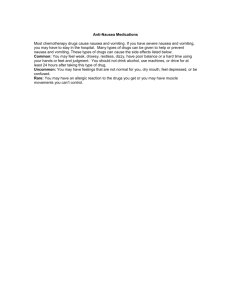
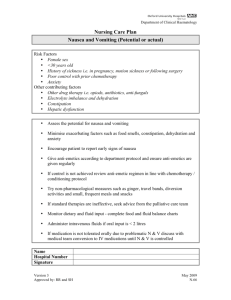
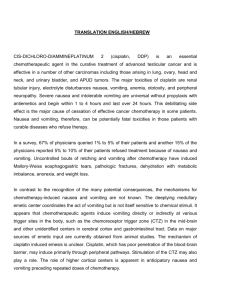
![[Physician Letterhead] [Select Today`s Date] . [Name of Health](http://s3.studylib.net/store/data/006995683_1-fc7d457c4956a00b3a5595efa89b67b0-300x300.png)
